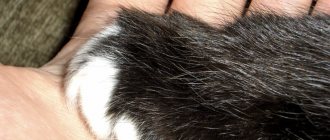Cat owners have often observed interesting behavior in their pets. Many of the habits of tailed pets are provided by nature, others depend on external factors. We'll tell you what it means if your cat scratches the floor, and we'll also show you how to prevent the unpleasant consequences of this habit on your flooring.
If your pet is scratching the floor in the house, it is likely that the weather outside the window will worsen
If a cat scratches the door, how to stop it? We analyze the reasons and solutions
Reason 1: the cat wants to eat
It happens that owners forget to feed the cat, and then they wonder why he scratches at the door. It is possible that this is how he attracts your attention and tries to remind you of the direct responsibility of a person to feed the cat delicious food every day.
Another problem could be that it's time to eat, but the door on the way to the bowl is closed . This scenario cannot be written off.
Solution:
Reason 2: the cat needs to sharpen its claws
Sharpening claws for cats is not a whim, but a necessity. To be good predators or to defend against larger predators, sharp claws are very necessary. If the door is wooden and upholstered, it can be an excellent tool for sharpening claws . Fortunately, the owners have a chance to convince the kitty otherwise. We'll tell you how to stop a cat from scratching at the door by getting it used to the scratching post.
Solution:
Reason 3: the cat is bored and seeks your attention
Imagine that you are locked up in your apartment all your life, and the toys you have, at best, are a ball and a mouse on a stick. Only no one plays mouse and ball with you, because your roommates are busy with their own important matters: they go away for half a day to work, cook something in the kitchen, watch TV or just sleep. Is it really boring? Well, how can you not stretch out to your full height and tear open the door with all your heart? After all, as soon as this happens, you will be immediately noticed and rewarded with long-awaited attention.
A similar situation can happen to your cat. He can easily lack your attention and attract it in such a unique way, which, admit it, works well.
Solution:
Reason 4: the cat wants to reclaim its territory
Now let's make another analogy. Imagine that you have your own apartment. Let's say it's a two-room apartment. And then, one fine day, someone takes and locks this room from you, and locks it. Of course, such an act will cause you indignation. Cats will have a similar reaction.
Cats are territorial animals . They strive to appropriate a certain space for themselves with the help of smells and protect it from strangers. If the door is closed, they lose access to their territory, which creates a desire to regain it. The scratching of the door is an attempt to do this.
Solution:
Instincts
Some experts believe that cats (compared to other domesticated animals) have retained keen ancient instincts. That is, the domestic cat is prone to very wild actions and burying food is one of them
There is no need to talk about the need and importance of breathing. Oxygen ensures the vital functions of the body, but it is useless without food and water, since a dead animal does not experience hunger
The very first and most obvious reason for burying a bowl after eating is the desire to hide leftover food from competitors and thereby provide one of the basic needs - satisfying hunger. A wild cat does not return with prey from every hunt, and such supplies are literally vital.
The second unconditional instinct that explains burying is the desire for cleanliness. A wild animal, and especially a predator, cannot give itself away by smell. Firstly, the cat will be smelled by its prey, and secondly, it itself can become a victim of a larger predator. If food has a strong, attractive smell, hiding it is a completely natural desire.
The opposite situation occurs when the cat is very hungry or has not had enough to eat. In the first case, the four-legged animal begins to dig the floor as soon as it eats more than half of the portion; in the second, after finishing the meal. The tailed one is trying to “dig up” the supplies from the floor in which they were supposedly buried. The reason is simple, the cat is guided by the unconditional desire for satiety. However, you should not indulge the tailed cat, do not leave food in the bowl and continue to feed the cat on a schedule, gradually increasing the portion and observing the animal’s behavior.
Note! Digging and burying food may not be a constant phenomenon, but only appears in the fall or spring. Everything can be explained by vitamin deficiency, and at the same time an increase in appetite
An equally common cause of constant hunger is parasites, or more precisely, worms.
The cat lives in your home, but at the same time considers the entire territory its property. The pet marks furniture and walls with its scent, and cats tend to mark the perimeter. Natural instincts to keep things clean can result in a desire to clean. The main factor motivating the burying instinct is also the smell, an unpleasant, unbearable, unacceptable smell. The owner is not surprised when the pet buries its “goods” in the tray; when burying a bowl, it can be guided by the same instincts.
Can food smell that unbearable? As practice shows, it can. Most often, this behavior manifests itself in relation to cheap dry food with a pungent, sour odor. A cat will show a similar reaction if the food is spoiled, stored open for a long time or is damp.
Advice: if your pet refuses high-quality dry food, bury it and boycott it in every possible way, the reason may lie in the cat’s personal preferences. Perhaps your tailed one simply does not like the taste of this particular “drying” or has arranged a fasting day for itself.
Competitors living in the house can provoke the cat to become “thrifty.” Moreover, competition itself does not play a special role; its probability is important. Wild cats live in prides, in which a clear chain of command is observed. In a pack consisting of several adults, a child, a cat, a dog, a hamster or other pets, subordination is broken... it does not exist in principle.
Note! The desire to hide food from competitors is especially pronounced in animals that have survived hunger.
What other ways are there to solve the problem?
Repellent sprays
How to stop a cat from scratching at the door if nothing helps? One of the methods is to use unpleasant odors , because cats are very sensitive to them, since they have a sensitive sense of smell.
Pet stores sell special sprays with a repellent odor . Spray the door with it, and the cat is unlikely to want to approach it. The main thing is to remember to use them regularly, as odors can dissipate.
If you want to save money, you can try making a homemade spray with a similar effect. To do this, squeeze a lemon or orange into water, pour it into a spray bottle and spray the door or the area next to it.
Cats don't like the smell of citrus fruits, you can take advantage of this
Upbringing
education , the most reliable and proven method, will help to wean it off once and for all
Praise your cat every time he uses a scratching post instead of a door. Along with praise, it doesn't hurt to give him a treat . You can use the negative reinforcement method. Threaten your cat in a stern voice when he breaks your rules. Although cats do not understand words, they sense intonation .
Video about interesting facts about cats
When my cat Vaska first started burying his bowl of treats, I was taken aback. I think I always ate fish bought in the same place, but here I have such an attitude towards it. But, as it turned out, the fish was not the freshest. If not for his burying movements, I would not have guessed anything. And, thanks to his behavior, I realized that something was wrong here, I sniffed and realized that I had been deceived. I took a good look at the fish and on the same day returned it to the store, exchanging it for a fresh one. I will add that such a reaction of a pet can save it and its owners from poisoning and deception by dishonest sellers.
We have a case where there is competition - there are two cats. Buries one. By the way, you can put some kind of scrap or scarf next to the bowl, then the cat actually covers his food with it. And the second cat doesn’t touch her.
Double sided tape
A controversial method, because if the tape comes off, it will most likely stick to the cat. And if the cat is curious, he may feast on it, but the consequences may not be very good. But if you constantly monitor the cat, then the method will work.
The fact is that cats do not like sticky surfaces . If there is double-sided tape on the door, the mustachioed person is unlikely to like it. The door will remain alone, and this is what we wanted.
An alternative to double-sided tape can be a special tape Sticky Paws . It was created for naughty cats like yours.
Why do dogs eat feces?
This behavior, called coprophagia, occurs because the dog has diabetes or Cushing's syndrome, which changes its appetite. This can also happen due to nutritional deficiencies. But healthy pets often behave this way. This is explained by the fact that dogs learn this behavior during puppy life, when their mothers eat excrement to keep the “house” clean.
Travel business in a coma: coronavirus has made travel anywhere in the world impossible
Like new: the coffee table was updated and a decorative design was applied to it
Cancer and Virgo: which zodiac sign is most disliked in other countries
Devices with motion detection
How to stop a cat from scratching at the door at night? A good way is to use automatic devices that will guard your sleep while the cat is awake. One of these is the Argus . The motion detector will understand when an enemy is approaching the door and will give the command to shoot compressed air . The result is capitulation. The solution is not bad, but temporary. For example, at night. During the day it will not be very convenient, since the motion detector will be triggered when you simply pass by. Another disadvantage is that the cylinders need to be changed regularly, and this is an extra item in your budget.
You can also perform the function of the device. Buy an air sprayer from a pet store and use it as directed whenever your cat damages the door. According to animal psychologists, this is one of the most humane methods.
Cats and entrance doors. Catch Me If You Can.
Running out the door is a potentially deadly behavior.
Cats that are not used to being outdoors are at serious risk. They could be hit by a car, attacked by other animals, get lost, eat poisonous bait, or fall prey to other dangers. No matter what your cat does when she escapes the door, whether she sits on the porch or stays in the yard, she is still in danger. This behavior must be corrected.
Correcting the behavior of fugitives.
First, stop petting and rewarding your cat when you are near the door. The cat should not receive your positive attention at the door. Chances are, it's very typical for you to lean over and greet your cat as soon as you open the door. Most likely, the cat is immediately waiting for you, running under the door as soon as she hears you turn the key in the lock. Now you should organize another place for greeting after work, which will be as far from the entrance as possible. You can arrange an official place for greetings and farewells at the other end of the apartment or house. This could be a cat tree, a windowsill, a chair, anywhere your cat likes to sit. Start by luring your cat to this area. You can call her name and then reward her with a treat when she goes in the right direction. You can use a fishing rod toy for bait. If your cat loves to be petted, call her to this spot and pet her as soon as she gets there. If you use a clicker to correct your cat's behavior, you can click and reward him every time he sits in that spot. Now all your greetings and farewells should take place here. All family members, without exception, must adhere to this rule. Make sure that to reward your cat you choose a treat that is so delicious or a game that is so interesting that the pleasure is much stronger than its desire to run out the open door. Reward your cat every time she says goodbye or meets you in this place. When you open the door to your apartment at the end of the day, do not look at your cat or greet him until you are in the formal greeting and goodbye area. This is where you can hug, kiss, lavish compliments and give treats. Keep treats nearby in a container (or even save some in your pocket) so that you can reward your cat when she comes to greet you. When you leave for work in the morning and your cat is following you and looking at the door with the intention of jumping out, throw her a toy or food puzzle with her favorite treat inside at the other end of the room, a second before the door opens. The food puzzle will keep your cat entertained throughout the day.
Scare the fugitive.
If your cat still refuses to cooperate when it comes to saying goodbye and greetings in a certain place and insists on having the right to run out as soon as you open the door, then it's time for some extreme methods to help your cat understand what the front door is. nothing good happens through the door. I usually recommend simply scaring the cat the moment it jumps out the front door. Some friends of mine kept their cat away from the front door forever in an interesting way. The man put on a silicone mask of some kind of monster and hid on the stairs, and the woman pretended to go out to the store. Of course, their cat did not miss the opportunity to jump out onto the stairwell. And then the man jumped out and growled terribly! The cat fluffed up like a ball and rushed headlong back into the apartment and almost knocked down the door. After that, it was impossible to lure him even close to the door. For especially impressionable cats, you can come up with a simpler scare. Other people I know simply invited friends with a dog that barks at cats. Naturally, the dog was kept on a leash and muzzled, but the cat didn’t know about this. She, as usual, jumped out the door, intending to make her run through the floors, but a dog came out from around the corner and began to tear and bark. This exercise was repeated several times, after which the cat stopped jumping out, and now can only occasionally carefully peek out from behind the door. Generally, I do not recommend that cat owners use a spray bottle for training. There are much more effective and positive methods of training cats. But when it comes to the risk of losing your cat and the potential danger of being hit by a car or other injury, and when other training attempts have failed, a spray bottle can help. Place a spray bottle near the outside of your front door so that anyone returning home can use it. If you see your cat sitting right in front of the door and trying to get out, lean over and spray water. After you have sprayed, close the door. Don't enter the house, you don't want your cat to associate you with unpleasant feelings. You want her to think it's the door that's being so unfriendly. Then wait three minutes and then try to log in again. The above describes only a few ways to wean a cat from running out the door. Surely you can come up with many more different means and techniques, based on the preferences of each specific cat.
Source
How to protect your floor from cat claws
By nature, a cat is a predator, for which its claws are a hunting tool. Of course, domestic cats almost completely forget about their instincts over time, but sometimes the animal can still remember its nature. In this case, there are several methods to protect the flooring and other objects in the house from cat claws.
Declawing
You can surgically remove your cat's claws permanently.
The operation during which an animal's claws are surgically removed is called onychectomy. It is worth noting that the procedure is effective, since you will forever protect yourself and your home from scratches.
Please also take into account the following points:
- in many countries the operation is prohibited because it is considered inhumane to animals;
- in our country, not every veterinarian will perform such a procedure;
- the price of onychectomy is quite high, so doctors willingly undertake it, whose only goal is to earn money, which casts doubt on the positive outcome of the operation;
- all manipulations are performed under general anesthesia, which negatively affects the health of the animal;
- there is a high probability of developing infections;
- the cat can only live at home - the animal will no longer survive on its own on the street;
- The phalanges are cut off along with the claws, and therefore rehabilitation for the cat will be long and painful.
Note! If you decide to surgically remove your pet's claws, you should purchase a special collar for the animal. In the first weeks after surgery, it is necessary to put it on your cat - otherwise your pet will constantly lick the stitches.
Photo of a cat after surgery wearing a special protective collar
Tendon trimming
A fairly radical measure also involves surgical intervention. In this case, a small piece is cut off from the tendon with which the cat releases its claws. Thus, the animal loses sensitivity in this place and will no longer be able to show its claws.
The operation is quite complicated, and the rehabilitation period for the cat is painful. There is a high risk of developing infections and other complications. In addition, you will have to regularly trim the animal’s claws, because the cat will no longer be able to sharpen them on its own.
Trimming claws
Only the transparent part of the claw can be trimmed.
Unlike the two methods described above, this procedure is more humane. If carried out correctly, the cat will not feel pain or discomfort. If you are going to trim an animal's claws for the first time, it is better to contact an experienced breeder or veterinarian.
A cat's claw has a blood vessel, so trimming should be done especially carefully. Look at the claw in the open - you only need to cut off the transparent part. If you hit a blood vessel, stop the bleeding with hydrogen peroxide.
Note! After trimming the claws, you should carefully monitor the animal. The cat will not be able to lead its usual life, therefore, not being able to catch on, it can easily fall from a window or from another height.
Protective caps
Silicone caps will provide reliable protection against cat claws
Recently, special caps for claws have appeared in pet stores. “Soft claws” are made of silicone and are glued using organic glue. The caps effectively protect against cat claws and are absolutely harmless to the animal.
“Soft claws” last from 4 to 8 weeks. When you first apply or replace caps, the animal's claws must be trimmed.
Accustoming a kitten to a scratching post
You can protect the floor and other objects in the house from scratches by training your cat to sharpen its claws in a certain place. To do this, you need to purchase a special scratching post at a pet store.
Do not think that it is difficult to accustom an animal to this device.
We bring to your attention a whole set of instructions, thanks to which the animal will sharpen its claws in the right place:
- place the scratching post where the animal scratches the floor or other objects, and then gradually move it to a place convenient for you;
- in order to attract the cat's attention to a new device, place your old thing on it;
- treat the scratching post with catnip extract - the substance will definitely attract the animal;
- place the device near the place where the cat usually sleeps - after sleep, sharpening the animal’s claws is a kind of gymnastics.
You can make a scratching post with your own hands. The best option is to fasten a piece of thick furniture fabric or carpet to the board.
Cat psychology
There is an opinion that cats are asocial creatures, introverts who prefer loneliness to human company. However, it is not. In fact, they need communication just as much as dogs. They enjoy spending time and playing together with their owner.
In addition, cats are territorial creatures. This means that they try to control the space that belongs to them and extremely dislike being limited in anything, especially if it concerns their property.
In the eyes of a pet, closed doors are precisely such a limitation, an obstacle behind which the cat’s territory is located.
To make sure that everything is in order there, the cat tends to open the doors. But as soon as this happens and she realizes that there is no danger, then interest in the room most often fades away.
borrow money against an apartment as collateral
It has been noticed: the more affectionate and sociable a cat is, the more worried it will be about the problem of a closed door. She can meow, scratch, scratch, trying in every possible way to attract the attention of the owner. Moreover, the peak of such activity will certainly occur at the time of the highest activity of the pet. That is, if a cat does not sleep at night, most likely, it is then that she will restore her order.
Reflexes, instincts, habits of cats
The cat is originally a predator; it has retained a wide variety of instincts and unconditioned reflexes. Instinct is the ability to act one way and not another, guided by subconscious beliefs.
All instincts can be divided into three main groups:
- The first group includes instincts that ensure the functioning of the body: food instinct, sleep instinct, etc. These instincts are simply necessary for any animal; life is impossible without them.
- The second group includes instincts that help individuals communicate and interact: parental instinct, sexual instinct, etc.
- The third group includes: the instinct of play, exploration and imitation.
When doing certain things, a cat is guided by its instincts, therefore, if a cat grabs a bowl with its food, this can be explained by the presence of certain instincts and reflexes in all cats.
What to do?
Fighting cat habits will require maximum attention and patience from the owner. But even this, alas, does not always guarantee a positive result. Sometimes you have to come to terms with your pet's character.
So, if your cat's habit of constantly opening doors bothers you, try the following measures:
Distract the cat . Catnip can help with this. Try rubbing it on a scratching post or cat tree to redirect your pet's attention;
Give physical activity . About an hour before bedtime, play properly with your pet, try to tire him out with intense games. A tired cat is unlikely to be able to be active at night;
Adhesive tape and tape . This method is based on cats' dislike of sticky surfaces. Try putting double-sided tape on the door. Perhaps it will discourage your pet from scratching and scratching;
Never mind . This method works well when it comes to a young cat. As a rule, maturing pets need attention, so they try in every possible way to attract the owner. Ignoring it will help you get rid of this habit. You can’t not only call your pet, but also shout and swear at it. Soon the cat will understand that its actions will not bring the expected results, and will stop doing it.
No matter how annoying your pet's behavior may be, try to understand it. When a cat scratches at the door, it is acting on an instinctive level.
If nothing helps in the fight against bad habits, try adapting the environment: you can, for example, install a cat hole on the door. This way the pet will be able to keep its territory under control and not disturb the owner.
Source
I have a cat (lazy and phlegm) and a cat (an awl in the butt and the need for constant communication) living at home. In the spring it will be 2 years. Both castrati.
Recently, the neighbor across the street (the door is directly opposite ours) got a cat (or cat, I don’t know). So now mine is just going crazy. He sits under the door and starts crying. And yesterday she generally rushed at the door, squealing, scratching the wallpaper, the door, jumping, pulling the handle.
At first I thought that the cat simply lacked communication. On the 8th I took my selection with me for a while. Also a cat, about a year old. He doesn’t let cats near him, hisses and rushes. The first days the cat was very happy with the new girl and tried to play with her, after 2-3 days she realized that the new girl was not making contact and began to react more aggressively. But for about a week she did not react to the neighbor’s cat. And yesterday it started again, with triple the force. As a moral lesson, I even let the cat out into the common corridor and closed the door. But she didn’t even think about sitting under the door and asking to go home, but walked with interest in the corridor and sniffed the next door, meowing under it. After 7-10 minutes, I couldn’t stand it and took her back (I was afraid that one of the neighbors would open the common door and the cat would be pinched or even taken away or thrown out).
The cat went completely crazy after that. She was banging on the door and screaming, running up to me and like a bullet to the door, saying, let me out.
In general, is it really possible to somehow distract the cat from these songs under the door? The neighbors probably think my cat is in heat. And that the cat is Siamese))
Source
Options for how to wean a cat from burying a bowl of food
There are many options for weaning an animal from burying. You should understand the possible reasons for this behavior, and then follow the basic tips:
give food often, but in smaller portions; you need to monitor what and how much your pet eats; you can distract your pet with a game if the owner sees that he is starting to hide his treat; Do not leave the bowl when the animal has eaten
It is better to remove the cup, clean the floor and simply refresh the cup of water; It is important to regularly wash and scrub the bowl itself to remove any residue; you need to check whether the cat likes the selected brand of food; do not place the place of eating near the pet’s toilet.. To wean the animal from a bad habit, you should understand the reasons
To wean an animal from a bad habit, you need to understand the reasons
Improve your cat's nutrition
Cats are very picky about what they eat. To wean the habit of burying food, you should adjust your diet. Basic tips:
- choose one good and high-quality brand of cat food manufacturer and stick to it in the future;
- organize meals several times a day at set times in small doses so that there is no waste left;
- reheat if necessary to increase appetite;
- you can pour chicken broth over the food to make it more attractive to your pet;
- It doesn't hurt to add a small amount of strong-smelling cheese to pique your pet's interest.
For your information!
If all else fails, you should switch to wet food. Sudden changes in diet without warning can cause stomach upset.
Washing the bowl
Washing the bowl is an important part of keeping your pet's dining area clean. Cats are very picky about the order around them, especially when eating.
A dirty bowl with leftovers from your last meal can be a source of disgust. The cat recognizes such food as garbage, which it will not eat. In an attempt to get rid of garbage, the animal will bury the bowl.
Important!
You should not wash the bowl with strong-smelling chemicals (household products), which can also discourage your pet from eating food. It is better to use regular laundry soap for these purposes.
It is preferable to use stainless steel utensils, since food debris can be easily removed from its walls. Plastic utensils absorb odors, and scratched surfaces can trap food residue.
Washing the bowl is the key to keeping your cat clean.
Comfortable place to eat
If your pet doesn't like the place where the food bowl is located, this fact will cause him discomfort when eating. The animal does not feel safe. The factor that is negative should be identified and eliminated. This may be: foreign or unpleasant odor, uncomfortable temperature. You should also make adjustments to the environment, for example, changing the location of the bowl.
Finally, why do pets bury their food? This is a survival instinct. Wild animals hunt and kill prey, eat food and hide the leftovers. According to the pet, food served in a bowl is no different from the fresh version. If he is not hungry enough to finish his meal, he will hide the evidence and hide it. Hiding food is a common cat behavior and is usually harmless. If the owner is interested in weaning his pet from such a habit, then it is enough to use the advice from this article.
The feeding behavior of domestic cats is based on the ancient instincts of their wild ancestors, ensuring their survival in the harsh conditions of the wild. That is why, when deciphering the signals given by a furry pet in “body language,” you need to turn to the behavioral stereotypes of feline predators. So why does a cat bury food? And what meaning does she put into this action?
If a Murka has eaten this or that amount of food and makes digging movements near a bowl with half-eaten contents, it means that it is, first of all, guided by the ancient instinct of a meat-eating animal after a successful hunt. It is he who tells her to hide the remains of the loot farther and deeper in order to:
Having inherited the above algorithm from their ancestors, pets can bury leftover food in a bowl for several reasons:
Why does the cat meow at the door?
The cat's meow is one of the most interesting forms of vocalization among our feline friends. Kittens will meow to their mother to communicate, but once your kitten becomes dependent and matures, meowing will remain exclusively for people. This is their way of communicating with us.
Now all cats are completely different. My cat is very vocal, meows when she wants to eat, announces when she has used her litter box, and sometimes communicates with me for no reason! Yours, on the other hand, may not meow at all. However, cats often meow at closed doors. But why is my cat meowing at the door? What is she trying to tell me?
Most of the time, cats meow at the door because they want to enter or leave the room and the door is blocking their way. They are trying to say “let me out.” However, when you can't let your cat out for whatever reason, sometimes she won't stop meowing at the door and it can be very annoying.
In this article, I'll explain in more detail why cats meow at doors—whether it's your bedroom door, the back door, or any other closed door in your home—and how you can stop it.
Instincts
Experts believe that among all domestic animals, cats have retained their instincts since ancient times. Although cats have long been domesticated by humans, they can still often exhibit their wild behavior. One such manifestation is burying food.
The first reason that comes to mind when we see a cat burying its food is the desire to hide it from other animals in order to ensure that its hunger is satisfied in the future. In the wild, not every animal hunt ends successfully, which is why burying reserves plays such an important role. With their help, you can hold out until the hunt is successful and not weaken.
Another possible reason is the love of cleanliness and the desire to hide the smell. In order to hunt successfully, a predator must smell absolutely nothing. Otherwise, the prey will smell the scent and hide. In addition, the smell can be sensed by a larger predator who wants to feast on the cat. In addition to the desire to eliminate the smell of its body, the cat wants the smell of its food not to attract anyone.
If an animal does not eat enough, it may begin to dig the floor either after it has eaten, or even earlier. The pet wants to dig up supplies that were supposedly buried before. The reason for this action is the desire for a feeling of satiety. Having noticed such actions, you need to feed your pet according to her usual schedule, but gradually increase the portion.
A pet can bury food only periodically. For example, during the off-season. When an animal suffers from vitamin deficiency. As a result, his appetite increases. In addition, hunger can be caused by the presence of parasites in the body.
It is known that these pets consider the house and its surroundings to be their domain. Cats and cats leave their scent on the territory. By burying food, the cat may simply strive for order. Maybe the smell of the food is unpleasant to her, and she is trying to eliminate it, as she does with the contents of the tray.
Can a cat smell that her food smells really bad? Based on the experience of many owners, this happens. For example, some dry food may smell unacceptable to a cat. Cheap, low-quality food has a too strong odor with a sour tint. In addition, even high-quality food can deteriorate if stored in improper conditions. This can also make your pet want to get rid of the terrible smell.
Sometimes a cat can bury even very good fresh food. The reason for this may simply be a reluctance to eat it. This is due to the animal's personal tastes. Perhaps the taste and smell of this particular dry food causes hostility in the cat.
The desire to bury food may appear if there are several pets in the house who are capable of eating cat food. Even if such cases have never occurred, the pet feels such a possibility. This is explained by the fact that in the wild, cats live in prides. In such groups, clear rules are followed. When a cat lives in an apartment with people and various other pets, these rules do not exist. The desire to bury food also often manifests itself in those pets who have experienced hunger. The cat is trying to make as many supplies as possible for this occasion.
Causes
There are several reasons why cats may meow at the door. It depends on what door they are meowing behind - whether it is an outside door or a closed door in your home. Looking at what time of day they meow and what side of the door you are on from them also helps determine what our feline friends are trying to communicate to us.
© shutterstock
Here are ten things your cat is trying to tell you.
They want to be allowed outside
If you are on the same side of a closed door as your cat and they meow and won't stop, they are probably trying to tell you that they want to be let outside. Where they want to go depends on where the door leads.
If they are meowing in your backyard, chances are they want to be in the garden or for a walk. On the other hand, if they are in the room with you and meow to come out, they may be telling you that they need to be let out, to use their litter box, or that they want a drink of water. You should always allow your cat to have access to essentials such as a litter tray and water, so be careful not to block her access to these.
They want to be let in
Of course, if cats meow because they want to be let outside, they will also meow because they want to be let back in. If you have an outdoor cat and you see them waiting at your front door or back door screaming, chances are they've explored enough and are ready to come back for a nap. If you have an outdoor cat, I suggest purchasing a cat cap so your kitty can come and go as he pleases.
renting apartments from the state in Mogilev
They want to be with you
If your cat isn't allowed into the room you're in and she's meowing at you from outside, she'll probably want to be with you. Even though cats are independent creatures, they can feel lonely and love to be close to their owners. This may be why your cat waits outside your bedroom door while you sleep. They just want to see you! If you hear a cat meowing, let her in and interact with the kitten.
However, many people specifically keep their cats out of their bedrooms. Perhaps you have mild allergies and want to keep your bedroom cat-free. You might just not want cat hair on your sheets. Or perhaps you don't like sleeping with the door open and don't want your cat sleeping with you so she can access her water and litter box throughout the night.
They missed someone
Another reason why your cat keeps meowing at the front door or back door could be because she is missing someone who is no longer in the house. For example, if you lived with a friend who moved away, your cat might miss his presence. Likewise, if your children have moved away for college, they may be calling for them to come back.
They want to be fed
If you and your cat are on opposite sides of a closed door in your home, your cat may also meow at the door because it wants to eat. They call you through the door and say: “Please feed me, man! If your cat meows and waits outside your bedroom door every morning, chances are she's waiting for breakfast.
You can also tell if your cat is trying to communicate this because when you open the door, she won't try to enter. Instead, she will run back to the feeding area. Cats will always try to tell you what they are talking about, so keep an eye on them and see where they are going and this will probably give you the answer.
They are curious
Have you heard that curiosity killed the cat? Well, there is some truth in this phrase. Cats are extremely inquisitive and love to explore the world around them. And there's nothing that sparks curiosity like a closed door where you don't know what's behind it. If your cat is meowing at a door where she has never been let out before, she may be curious about what's behind it.
It could be a room in your house that you've disconnected from them, or a house cat meowing at the door that leads outside and dying to know more. They may even be curious about the room they spend a lot of time in if they can hear and smell the new people inside. They want to see what's happening.
They are bored
Cats also get bored easily and need a lot of stimulating stimuli to keep them happy and entertained. If your cat won't stop meowing at the door, she may be bored. They may want you to play with them or give them extra attention, and won't stop meowing until they have something to do.
For anyone who has a house cat meowing at their door, boredom is a very likely reason. Cats are naturally free and independent creatures who love to roam and explore. However, indoor cats can be very happy staying inside their entire lives, but they need more enrichment than outdoor cats and plenty of toys and activities to keep them occupied.
They are greeting someone
Another possibility why your cat is meowing at the door is that she is trying to say hello to someone. If your cat greets you, you should feel flattered. Cats are independent animals, and if they go out of their way to greet you, they clearly love and appreciate you.
Your cat may greet you when you get home from work, or if your cat meows at your bedroom door in the morning, she may be trying to say, “Good morning!” Some cats wake up their owners by meowing outside their room at the beginning of each day, which is not a very pleasant greeting. However, they don't intend to be a nuisance. They could say: “Wake up, wake up, sleepy head, it’s time to get up!” They are looking forward to the day ahead and have been missing you all night. Plus, they'll probably want to eat breakfast!
© shutterstock
They call a friend
Many owners have cats that have been spayed or neutered, so this point is unnecessary. However, for any cat that is still reproductively intact, your cat may be ringing the doorbell leading outside as they want to mate.
Cats in heat will meow at the door to communicate with nearby males that they are ready to reproduce and want to find an active mate. You will be able to tell if your cat is leaking as she will also begin to rub her body excessively against you and other objects in your home and will become much more affectionate.
They suffer from cognitive dysfunction
As cats age, their functions begin to decline. This includes physical abilities, such as not being able to jump and run as well as before, as well as mental abilities and cognitive functions. Cognitive dysfunction in cats is actually extremely common in older cats, affecting more than 55% of cats over 11 years of age and 80% of cats over 16 years of age.
Cat cognitive dysfunction can manifest itself in many different ways, but all symptoms are caused by a decreased ability to recall information, learn new skills, and understand the world around them. This can lead to severe disorientation and confusion for cats. Cats can forget where things are and what their routine looks like, and often suffer from anxiety as a result.
Source
Why did the cat stop burying the toilet?
Having figured out why cats bury the litter box, let's try to understand the reasons why they may not do this.
The simplest of all possible reasons is a dispute over territory or status in which the cat wants to remain the winner. Both the cat community and each individual animal have their own territory. It is in this territory that the cat dominates and feels confident. Cats jealously protect their territory from intrusion and encroachment, marking the boundaries with their scent and even, if necessary, getting into a fight.
Therefore, if people come into your home who seem hostile or unpleasant to your cat, he may well change his behavior, starting to leave feces everywhere, without even trying to cover it up with anything.
Who is the boss in the house?
Problems can also arise when a new animal appears in the house, especially if it is another cat. The hierarchy in a cat community is more complex and flexible than, for example, in a pack of dogs.
In addition, if several animals live in the same apartment with a person, that person constantly interferes in their lives, disturbing, even if unwittingly, the fragile balance of relations between members of the pride. The dominant position in it, as a rule, is occupied by the cat.
It is she who, as a rule, does not bury her feces in the toilet; other pets bury them behind them, hiding their smell out of respect for her.
When a stranger appears, the established hierarchy is inevitably subject to revision, both through fights and through psychological pressure
The dominant cat will have to defend his position, and until the new hierarchy is established and accepted by everyone, it is very important that the person behaves rationally
If you don't do anything stupid, the cats themselves will come to an excellent agreement among themselves. If you begin to punish the main cat, humiliating it in front of its relatives, then its anxiety and aggressiveness will only intensify, and fecal wars in your apartment can drag on for a long time.
Family atmosphere
Sometimes cats include both people and other animals living in the apartment into their community. The hierarchy in such cases becomes more complex and confusing, and it is not always possible to understand who has what status in this extended family. In such interspecific conglomerates, very curious cases sometimes occur.
For example, animals begin to interfere in relations between members of the human family, and even try to regulate them by taking sides. For example, the author knows of a case when, after a quarrel between spouses, the entire cat family that lived in the apartment urinated in the bed of the owner of the house.
In this situation, the behavior of animals is influenced not only by the internal climate of the cat pride, but also by the general atmosphere of the family. Scientists have noticed that cats living in harmonious and conflict-free families have the least behavioral problems. Then they recognize the person as the main one, themselves as the youngest in the pride, and live happily in a world they understand.
Shy cat
Or maybe it’s all about “shyness” - at the moment of performing natural needs, the animal is very vulnerable, and timid cats may experience discomfort, not feeling safe.
In this case, you should try a toilet house closed on all sides. Don't be afraid to experiment, and be attentive to your pet. Perhaps, by his behavior, he himself will tell you everything about himself that you would like to know.
Of course, completely prosaic explanations are possible for a cat’s reluctance to bury behind itself. He may simply not like the litter box, the litter, or the smell of the fragrance in the toilet. Replacing the litter will also help you if the cat rummages around in the tray too zealously, scattering its contents around.










